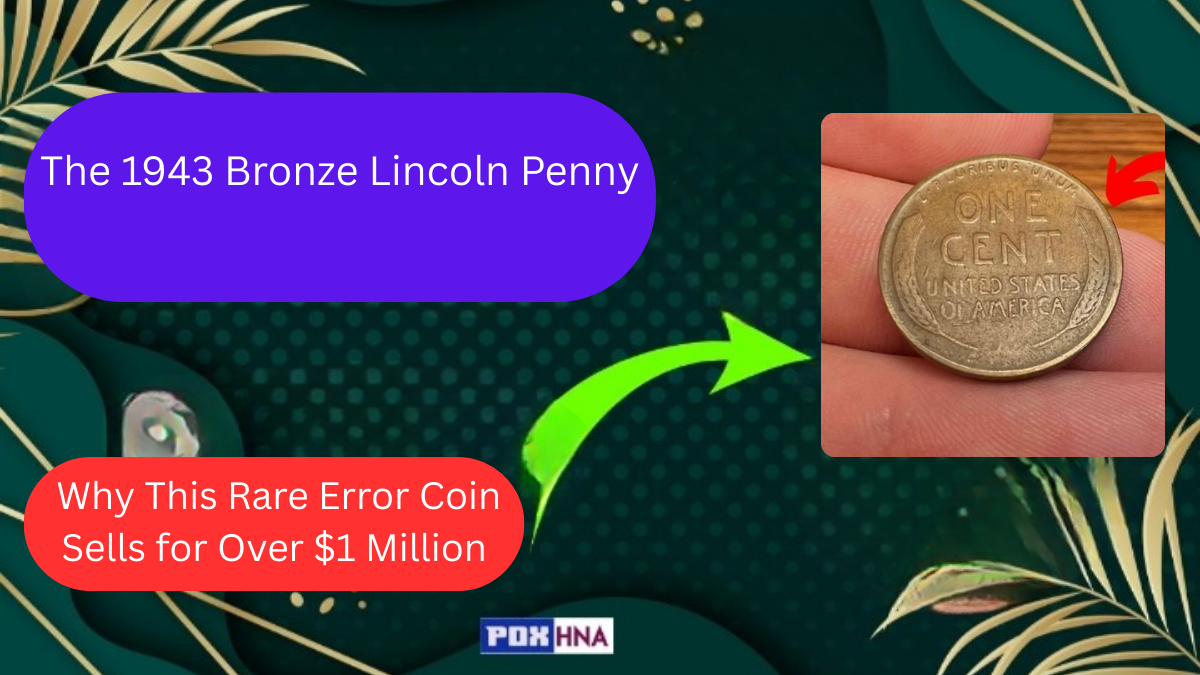Imagine finding a penny that could change your life. In 1943, the U.S. Mint was focused on wartime efforts, switching to steel for penny production to save copper for military use. But a few copper blanks from 1942 accidentally got stamped in 1943 — creating one of the most valuable coin errors in American history: The 1943 Bronze Lincoln Penny. With only a handful known to exist, this coin is not just a collector’s dream — it’s worth over $1 million at auction. Let’s explore what makes this tiny piece of metal so incredibly valuable.
Coin Name: 1943 Bronze Lincoln Penny
Why It’s Unique
In 1943, nearly all Lincoln cents were made of zinc-coated steel instead of copper. However, by mistake, some leftover bronze (copper-based) planchets from the 1942 batch were used. These rare bronze pennies were struck and released into circulation unnoticed.
How to Identify It
- Date: 1943
- Color: Reddish-brown or copper-like (not grey or silvery like normal 1943 steel cents)
- Magnetic Test: A real bronze 1943 penny is not magnetic (unlike steel cents)
- Weight: Around 3.11 grams (steel pennies weigh 2.7 grams)
Known Locations
Most known 1943 bronze pennies were struck at the Philadelphia Mint, but rare examples have surfaced from the San Francisco (S) and Denver (D) mints too.
Value in Auctions
Depending on the condition, some specimens of this penny have sold for over $1 million, with record prices hitting up to $1.75 million for high-grade examples.
The 1943 Bronze Lincoln Penny stands as a shining example of how minting mistakes can lead to millionaire treasures. Its combination of rarity, historical context, and demand among collectors has turned it into a legend in the coin collecting world. If you happen to come across an old 1943 penny that looks bronze instead of steel, don’t ignore it — it could be worth a fortune. As collectors continue to hunt for these elusive coins, their value and mystery only grow with time
Quick Facts Table
| Feature | Details |
|---|---|
| Coin Name | 1943 Bronze Lincoln Penny |
| Metal Composition | 95% Copper, 5% Tin and Zinc |
| Weight | 3.11 grams |
| Mint Locations | Philadelphia (no mint mark), S, D |
| Typical Value | $250,000 to $1.75 million+ |
| Error Type | Wrong planchet (bronze used in 1943) |
| Magnetic? | No |
| Known Examples | Fewer than 20 confirmed |
FAQ’s:
Q1: Why was the 1943 penny supposed to be made of steel?
A: Due to World War II, copper was needed for ammunition, so the U.S. Mint switched to zinc-coated steel to conserve copper.
Q2: How did the bronze 1943 penny happen?
A: Leftover copper planchets from 1942 were accidentally used during the early 1943 production run, resulting in a small number of bronze pennies.
Q3: How can I check if I have a real 1943 bronze penny?
A: First, see if it sticks to a magnet (it shouldn’t). Then check its color, weight (should be around 3.11g), and consult a coin expert or grading service.
Q4: How many 1943 bronze Lincoln pennies exist?
A: Less than 20 are known to exist across all mint marks, making it one of the rarest U.S. coins.
